Da Pan
Research on Audio-Visual Quality Assessment Dataset and Method for User-Generated Omnidirectional Video
Jun 12, 2025Abstract:In response to the rising prominence of the Metaverse, omnidirectional videos (ODVs) have garnered notable interest, gradually shifting from professional-generated content (PGC) to user-generated content (UGC). However, the study of audio-visual quality assessment (AVQA) within ODVs remains limited. To address this, we construct a dataset of UGC omnidirectional audio and video (A/V) content. The videos are captured by five individuals using two different types of omnidirectional cameras, shooting 300 videos covering 10 different scene types. A subjective AVQA experiment is conducted on the dataset to obtain the Mean Opinion Scores (MOSs) of the A/V sequences. After that, to facilitate the development of UGC-ODV AVQA fields, we construct an effective AVQA baseline model on the proposed dataset, of which the baseline model consists of video feature extraction module, audio feature extraction and audio-visual fusion module. The experimental results demonstrate that our model achieves optimal performance on the proposed dataset.
Towards Holistic Visual Quality Assessment of AI-Generated Videos: A LLM-Based Multi-Dimensional Evaluation Model
Jun 05, 2025



Abstract:The development of AI-Generated Video (AIGV) technology has been remarkable in recent years, significantly transforming the paradigm of video content production. However, AIGVs still suffer from noticeable visual quality defects, such as noise, blurriness, frame jitter and low dynamic degree, which severely impact the user's viewing experience. Therefore, an effective automatic visual quality assessment is of great importance for AIGV content regulation and generative model improvement. In this work, we decompose the visual quality of AIGVs into three dimensions: technical quality, motion quality, and video semantics. For each dimension, we design corresponding encoder to achieve effective feature representation. Moreover, considering the outstanding performance of large language models (LLMs) in various vision and language tasks, we introduce a LLM as the quality regression module. To better enable the LLM to establish reasoning associations between multi-dimensional features and visual quality, we propose a specially designed multi-modal prompt engineering framework. Additionally, we incorporate LoRA fine-tuning technology during the training phase, allowing the LLM to better adapt to specific tasks. Our proposed method achieved \textbf{second place} in the NTIRE 2025 Quality Assessment of AI-Generated Content Challenge: Track 2 AI Generated video, demonstrating its effectiveness. Codes can be obtained at https://github.com/QiZelu/AIGVEval.
Baichuan-Audio: A Unified Framework for End-to-End Speech Interaction
Feb 24, 2025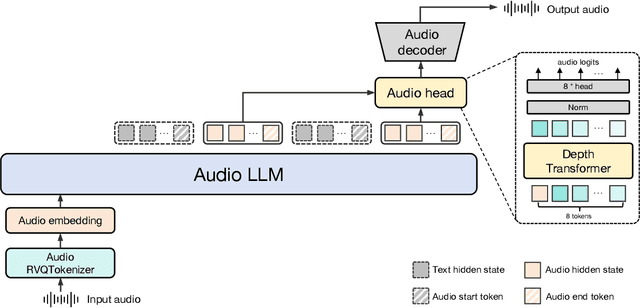

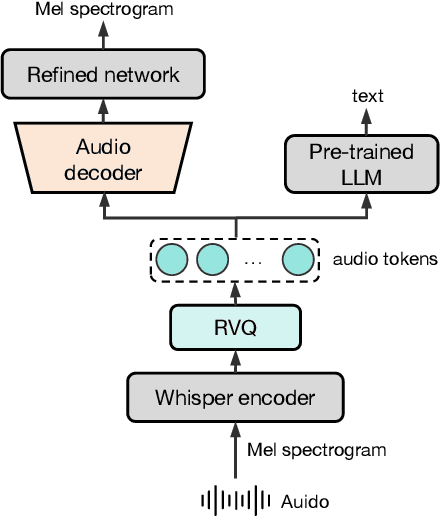
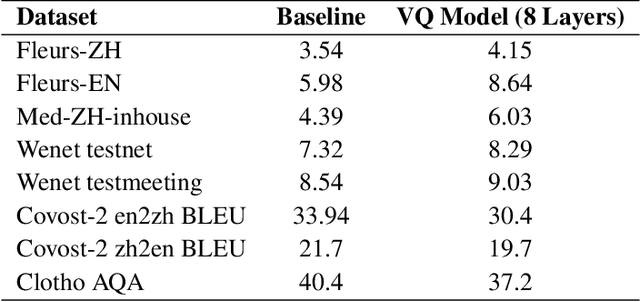
Abstract:We introduce Baichuan-Audio, an end-to-end audio large language model that seamlessly integrates audio understanding and generation. It features a text-guided aligned speech generation mechanism, enabling real-time speech interaction with both comprehension and generation capabilities. Baichuan-Audio leverages a pre-trained ASR model, followed by multi-codebook discretization of speech at a frame rate of 12.5 Hz. This multi-codebook setup ensures that speech tokens retain both semantic and acoustic information. To further enhance modeling, an independent audio head is employed to process audio tokens, effectively capturing their unique characteristics. To mitigate the loss of intelligence during pre-training and preserve the original capabilities of the LLM, we propose a two-stage pre-training strategy that maintains language understanding while enhancing audio modeling. Following alignment, the model excels in real-time speech-based conversation and exhibits outstanding question-answering capabilities, demonstrating its versatility and efficiency. The proposed model demonstrates superior performance in real-time spoken dialogue and exhibits strong question-answering abilities. Our code, model and training data are available at https://github.com/baichuan-inc/Baichuan-Audio
Baichuan-M1: Pushing the Medical Capability of Large Language Models
Feb 18, 2025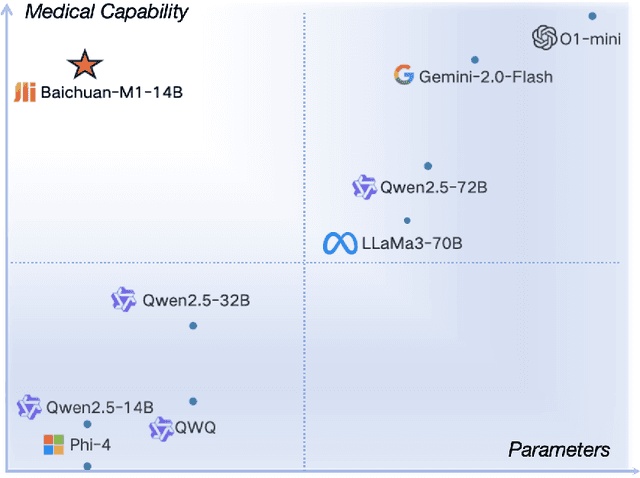

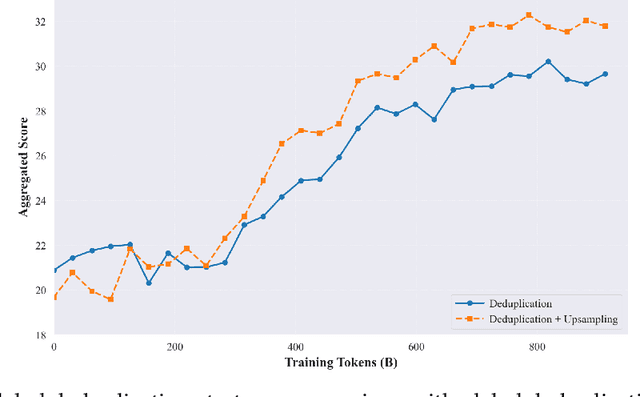

Abstract:The current generation of large language models (LLMs) is typically designed for broad, general-purpose applications, while domain-specific LLMs, especially in vertical fields like medicine, remain relatively scarce. In particular, the development of highly efficient and practical LLMs for the medical domain is challenging due to the complexity of medical knowledge and the limited availability of high-quality data. To bridge this gap, we introduce Baichuan-M1, a series of large language models specifically optimized for medical applications. Unlike traditional approaches that simply continue pretraining on existing models or apply post-training to a general base model, Baichuan-M1 is trained from scratch with a dedicated focus on enhancing medical capabilities. Our model is trained on 20 trillion tokens and incorporates a range of effective training methods that strike a balance between general capabilities and medical expertise. As a result, Baichuan-M1 not only performs strongly across general domains such as mathematics and coding but also excels in specialized medical fields. We have open-sourced Baichuan-M1-14B, a mini version of our model, which can be accessed through the following links.
Baichuan-Omni-1.5 Technical Report
Jan 26, 2025
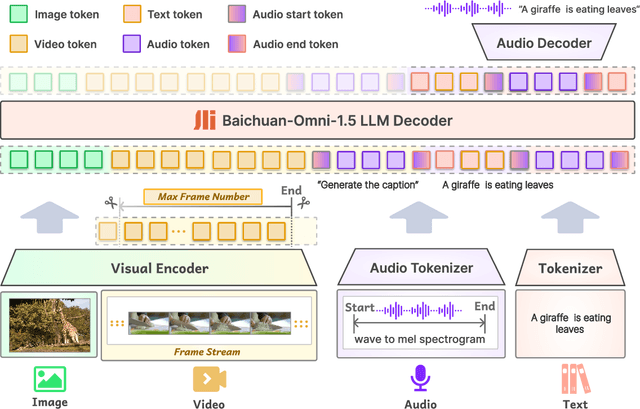
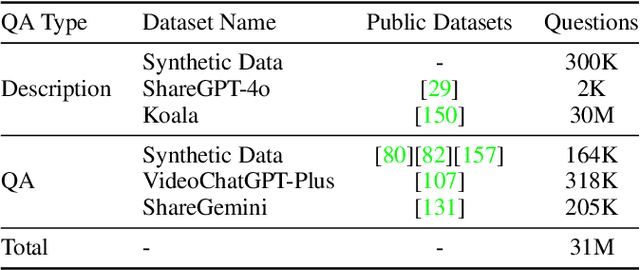
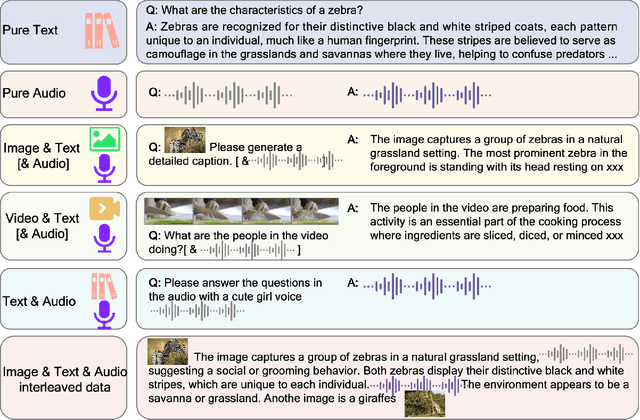
Abstract:We introduce Baichuan-Omni-1.5, an omni-modal model that not only has omni-modal understanding capabilities but also provides end-to-end audio generation capabilities. To achieve fluent and high-quality interaction across modalities without compromising the capabilities of any modality, we prioritized optimizing three key aspects. First, we establish a comprehensive data cleaning and synthesis pipeline for multimodal data, obtaining about 500B high-quality data (text, audio, and vision). Second, an audio-tokenizer (Baichuan-Audio-Tokenizer) has been designed to capture both semantic and acoustic information from audio, enabling seamless integration and enhanced compatibility with MLLM. Lastly, we designed a multi-stage training strategy that progressively integrates multimodal alignment and multitask fine-tuning, ensuring effective synergy across all modalities. Baichuan-Omni-1.5 leads contemporary models (including GPT4o-mini and MiniCPM-o 2.6) in terms of comprehensive omni-modal capabilities. Notably, it achieves results comparable to leading models such as Qwen2-VL-72B across various multimodal medical benchmarks.
Med-R$^2$: Crafting Trustworthy LLM Physicians through Retrieval and Reasoning of Evidence-Based Medicine
Jan 21, 2025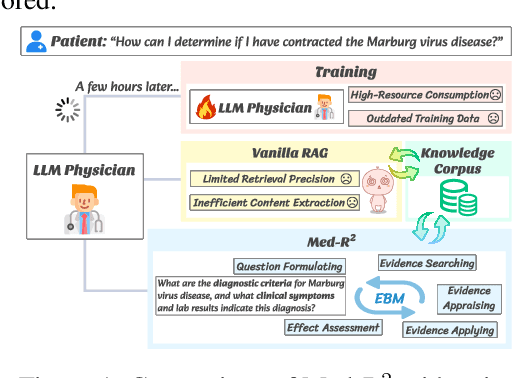
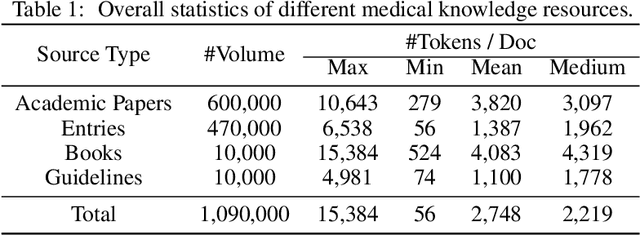
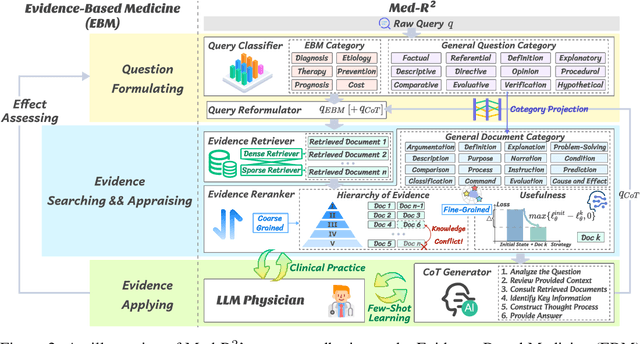
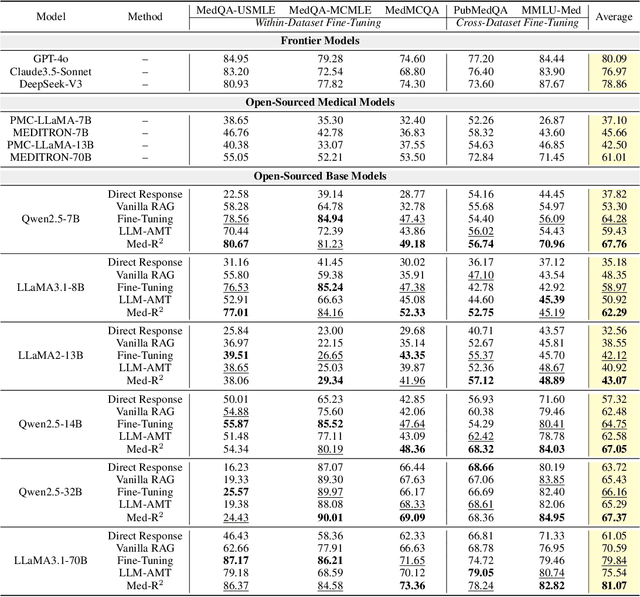
Abstract:In recent years, Large Language Models (LLMs) have exhibited remarkable capabilities in clinical scenarios. However, despite their potential, existing works face challenges when applying LLMs to medical settings. Strategies relying on training with medical datasets are highly cost-intensive and may suffer from outdated training data. Leveraging external knowledge bases is a suitable alternative, yet it faces obstacles such as limited retrieval precision and poor effectiveness in answer extraction. These issues collectively prevent LLMs from demonstrating the expected level of proficiency in mastering medical expertise. To address these challenges, we introduce Med-R^2, a novel LLM physician framework that adheres to the Evidence-Based Medicine (EBM) process, efficiently integrating retrieval mechanisms as well as the selection and reasoning processes of evidence, thereby enhancing the problem-solving capabilities of LLMs in healthcare scenarios and fostering a trustworthy LLM physician. Our comprehensive experiments indicate that Med-R^2 achieves a 14.87\% improvement over vanilla RAG methods and even a 3.59\% enhancement compared to fine-tuning strategies, without incurring additional training costs.
Comprehensive Subjective and Objective Evaluation Method for Text-generated Video
Jan 15, 2025



Abstract:Recent text-to-video (T2V) technology advancements, as demonstrated by models such as Gen3, Pika, and Sora, have significantly broadened its applicability and popularity. This progress has created a growing demand for accurate quality assessment metrics to evaluate the perceptual quality of text-generated videos and optimize video generation models. However, assessing the quality of text-generated videos remains challenging due to the presence of highly complex distortions, such as unnatural actions and phenomena that defy human cognition. To address these challenges, we constructed a large-scale benchmark dataset for \textbf{T}ext-generated \textbf{V}ideo \textbf{eval}uation, \textbf{T2VEval-Bench}, comprising 148 textual words and 1,783 videos generated by 12 models. During the subjective evaluation, we collected five key scores: overall impression, video quality, aesthetic quality, realness, and text-video consistency. For objective evaluation, we developed the \textbf{T2VEval} model, which assesses videos across three branches: quality, authenticity, and consistency. Using an attention-based fusion module, T2VEval effectively integrates features from each branch and predicts scores with the aid of a large oracle model. Additionally, we implemented a progressive training strategy, enabling each branch to learn targeted knowledge while maintaining synergy with the others. Experimental results demonstrate that T2VEval achieves state-of-the-art performance across multiple metrics. The dataset and code will be open-sourced upon completion of the follow-up work.
VersaTune: An Efficient Data Composition Framework for Training Multi-Capability LLMs
Dec 02, 2024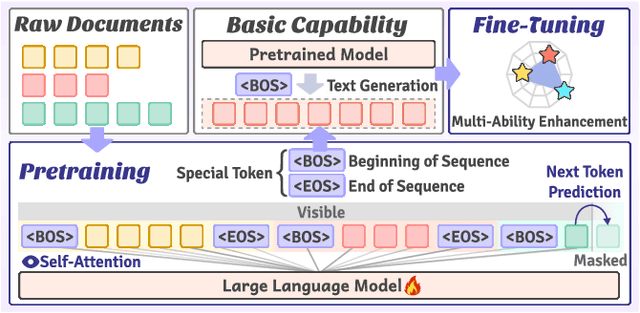



Abstract:Large-scale pretrained models, particularly Large Language Models (LLMs), have exhibited remarkable capabilities in handling multiple tasks across domains due to their emergent properties. These capabilities are further augmented during the Supervised Fine-Tuning (SFT) phase. Despite their potential, existing work mainly focuses on domain-specific enhancements during fine-tuning, the challenge of which lies in catastrophic forgetting of knowledge across other domains. In this study, we introduce VersaTune, a novel data composition framework designed for enhancing LLMs' overall multi-ability performances during training. We categorize knowledge into distinct domains including law, medicine, finance, science, code, etc. We begin with detecting the distribution of domain-specific knowledge within the base model, followed by the training data composition that aligns with the model's existing knowledge distribution. During the training process, domain weights are dynamically adjusted based on their learnable potential and forgetting degree. Experimental results demonstrate that VersaTune achieves significant improvements in multi-domain performance, with an 35.21% enhancement in comprehensive multi-domain tasks. Additionally, in scenarios where specific domain optimization is required, VersaTune reduces the degradation of performance in other domains by 38.77%, without compromising the target domain's training efficacy.
VersaTune: Harnessing Vertical Domain Insights for Multi-Ability LLM Supervised Fine-Tuning
Nov 24, 2024



Abstract:Large Language Models (LLMs) exhibit remarkable capabilities in handling multiple tasks across domains due to their emergent properties. These capabilities are further augmented during the Supervised Fine-Tuning (SFT) phase. Despite their potential, existing work mainly focuses on domain-specific enhancements during fine-tuning, the challenge of which lies in catastrophic forgetting of knowledge across other domains. In this study, we introduce VersaTune, a novel data composition framework designed for enhancing LLMs' overall multi-ability performances during fine-tuning. We categorize knowledge into distinct domains including law, medicine, finance, science, code. We begin with detecting the distribution of domain-specific knowledge within the base model, followed by the composition of training data that aligns with the model's existing knowledge distribution. During the fine-tuning process, weights of different domains are dynamically adjusted based on their learnable potential and forgetting degree. Experimental results demonstrate that VersaTune achieves significant improvements in multi-domain performance, with a 35.21% enhancement in comprehensive multi-domain tasks. Additionally, in scenarios where specific domain optimization is required, VersaTune reduces the degradation of performance in other domains by 38.77%, without compromising the target domain's training efficacy.
VersaTune: Fine-Tuning Multi-Ability LLMs Efficiently
Nov 18, 2024



Abstract:Large Language Models (LLMs) exhibit remarkable capabilities in handling multiple tasks across domains due to their emergent properties. These capabilities are further augmented during the Supervised Fine-Tuning (SFT) phase. Despite their potential, existing work mainly focuses on domain-specific enhancements during fine-tuning, the challenge of which lies in catastrophic forgetting of knowledge across other domains. In this study, we introduce VersaTune, a novel data composition framework designed for enhancing LLMs' overall multi-ability performances during fine-tuning. We categorize knowledge into distinct domains including law, medicine, finance, science, code. We begin with detecting the distribution of domain-specific knowledge within the base model, followed by the composition of training data that aligns with the model's existing knowledge distribution. During the fine-tuning process, weights of different domains are dynamically adjusted based on their learnable potential and forgetting degree. Experimental results demonstrate that VersaTune achieves significant improvements in multi-domain performance, with a 35.21% enhancement in comprehensive multi-domain tasks. Additionally, in scenarios where specific domain optimization is required, VersaTune reduces the degradation of performance in other domains by 38.77%, without compromising the target domain's training efficacy.
 Add to Chrome
Add to Chrome Add to Firefox
Add to Firefox Add to Edge
Add to Edge